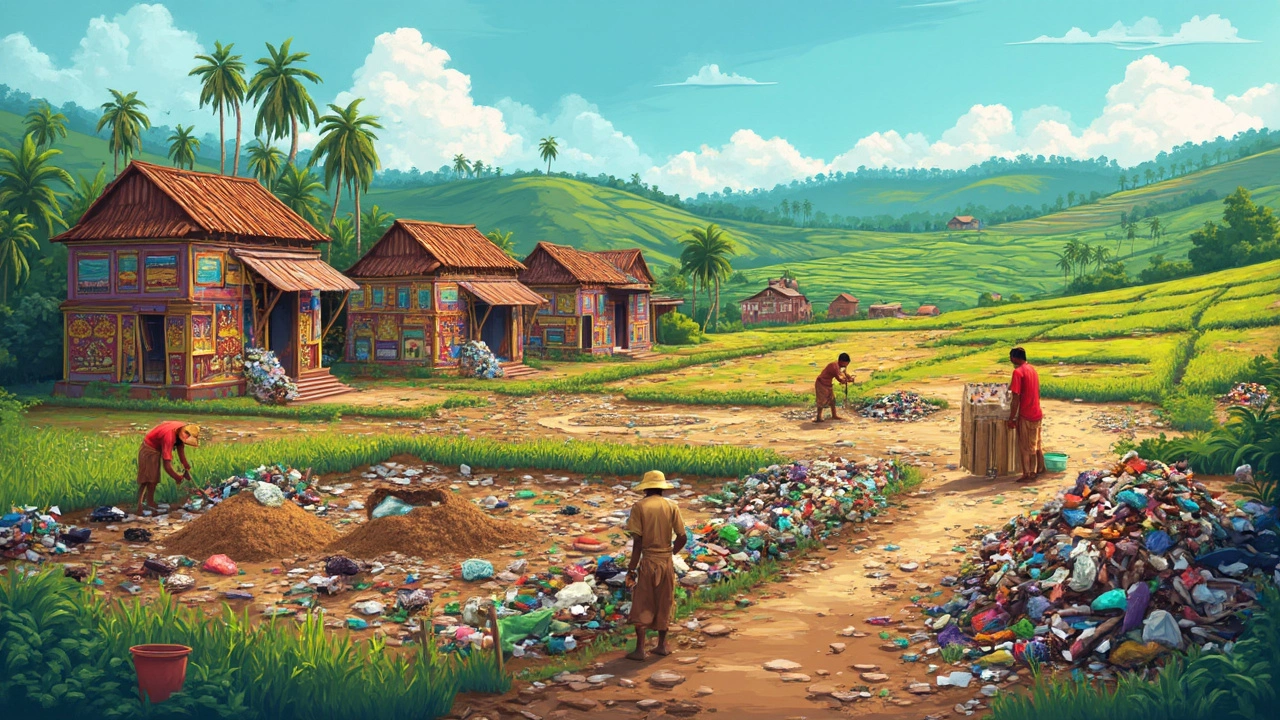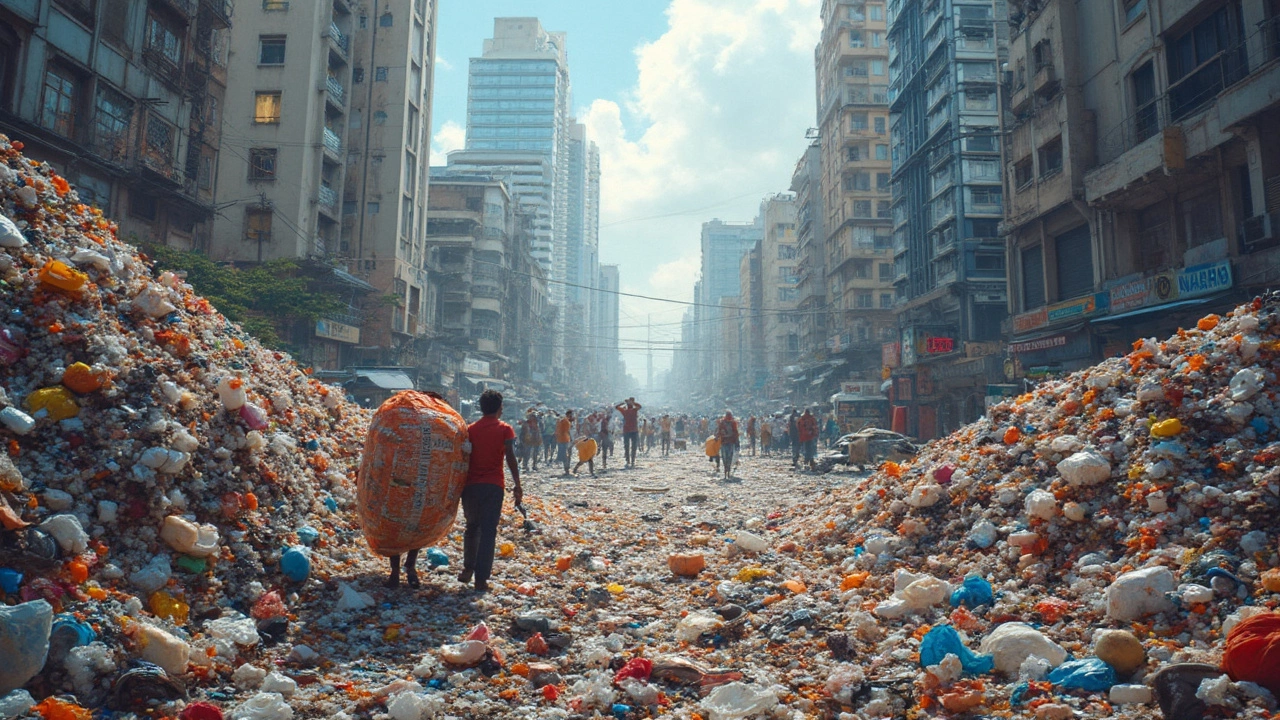Alright, let's talk garbage. We're diving into a messy world, quite literally, as we try to figure out which country has the worst waste problem. It's not just about who has the most trash – it's about how they handle it, the policies in place, and the impact on the environment. Spoiler: It's pretty shocking in some places, mainly thanks to the incredible amount of plastic waste.
Get this: The world dumps about 2.01 billion tonnes of waste annually. And surprise, surprise, only 33% of it is managed in an environmentally safe manner. That leaves a ton (and then some!) floating around causing trouble. But the real shocker? Plastic manufacturers are pumping out over 300 million tonnes of plastic every year, adding to the chaos.
In the next few paragraphs, we'll zero in on some of the countries battling mountains of waste and what makes it so challenging for them. Factors like population density and weak recycling infrastructure often play a part. Plus, we'll chat about how plastic manufacturing is a massive culprit and what can be done to tackle these junkyard giants.
- The Global Waste Picture
- Top Countries Battling Waste
- Plastic Manufacturers' Role
- Steps Toward Improvement
The Global Waste Picture
So, let's paint the global scene of waste, shall we? Waste management is no small feat. With over 8 billion people on this spinning globe, we're churning out trash like there's no tomorrow. What's scarier is the fact that, globally, less than 20% of waste is recycled, and most of it ends up in landfills or scattered around oceans.
Every year, millions of tonnes of plastic waste, one of the biggest culprits, make their way into our waters. Around 8 million tonnes to be exact – that's akin to dumping a garbage truck full of plastic into the ocean every minute. It's a grim picture and the frightening fallout is majorly toxic to marine life and our food chain.
Challenged Continents: A Closer Look
When you look at regions like Asia and Africa, the waste management systems are often overrun. Countries here seem to especially struggle under the weight of waste primarily due to rapid urbanization and industrialization. It’s not just about dealing with home-grown trash; they also grapple with imported waste, becoming unofficial dumping grounds for developed countries.
Let's not forget the role of plastic pollution. While Europe and the US are sitting on mountains of electronic and plastic waste, countries in Southeast Asia often find themselves at the receiving end of this unwanted trash tsunami. This is partly due to weaker regulations and cheaper processing costs.
Initiatives and Solutions
There is a small dose of good news, though. Some countries are rolling out initiatives to curb waste. In Bali, Indonesia, there's a ban on single-use plastics like bags, straws, and polystyrene. It gives you a glimpse of hope that more can follow.
However, not all efforts bear fruit without everyone's part. Awareness campaigns, the growth of recycling industries, and government incentives for waste reduction are all paving the way for change. Let’s be real: it’s a small dent in a hefty problem, but it sure counts as progress.
| Continent | Waste Generated (Million Tonnes/Year) |
|---|---|
| Asia | 800 |
| Europe | 450 |
| Africa | 70 |
At the end of the day, tackling the global waste problem requires cooperation across borders, changes in how waste management systems work, and a serious crackdown on the plastic manufacturing practices. It’s a work in progress but one worth sticking with.
Top Countries Battling Waste
Diving straight into the global scene, a few countries genuinely stand out when it comes to handling or, more accurately, struggling with their waste. Let's start with India. Home to over a billion people, it's no mystery that India's waste problem is massive. With daily waste generation hitting somewhere around 150,000 tonnes, managing it is no small feat.
The special challenge? Open dumping. This outdated method is still rampant, leading to severe pollution and health hazards. While efforts are underway to promote better waste management strategies, there's still a long road ahead.
China's Waste Dilemma
China is another big player. It's churning out plastic like there's no tomorrow – around 60 million tonnes of plastic waste every year. The country has made strides with initiatives to improve recycling and reduce plastic use, but the reality is, it's still battling the repercussions of rapid industrialization and urbanization.
United States: A League of Its Own
Crossing over to the U.S., it's not much smoother. The U.S. produces more waste per capita than any other leading nation. An average American generates around 2 kg of trash daily. Efforts like single-stream recycling are in place, but challenges persist due to contamination issues and fluctuating recycling markets.
The Philippines: Troubled Waters
Lastly, let’s not forget about the Philippines. It's one of the largest contributors to oceanic plastic pollution. With waste management systems that are often overwhelmed, plastics find their way into waterways, affecting both marine life and the livelihood of those depending on fishing.
Each of these countries represents a piece of the global waste puzzle. The problems they face are vast, but not insurmountable. By recognizing these challenges, there’s potential to find more effective solutions and strategies.

Plastic Manufacturers' Role
When it comes to pinpointing who contributes to our global plastic mess, you can't ignore the enormous role played by plastic manufacturing companies. These industrial giants churn out more plastic than you might imagine. Picture over 300 million tonnes of it hitting the market every year. That's a lot of plastic forks and water bottles.
What's wild is that a big chunk of this plastic ends up as single-use items—things designed to be tossed away almost immediately. It's this 'use it once, chuck it forever' mentality that's really plugging up our global waste system.
Major Producers: Who’s Leading the Pack?
Among these mega manufacturers, names like ExxonMobil, Dow Chemical, and Sinopec pop up often. They are some of the top producers on a global scale. To give you a clearer picture, ExxonMobil alone churns out millions of tonnes every year.
No Strings Attached: What's the Real Cost?
This massive production doesn't come cheap—at least not for the planet. Most of this plastic isn't recycled. Instead, it ends up in landfills, on our beaches, or floating in our oceans. Who pays for that? Well, ultimately, we all do, with polluted land and poisoned wildlife.
A quick peek at the math shows that just about 9% of all this plastic actually makes it to the recycling bin. The rest either gets burned, buried, or worse, leaks into nature. That's why increasing pressure is being placed on these firms to step up and take some responsibility.
Plastic Producers: What Should They Do?
So, what can these producers do? The answer lies in embracing environmental issues head-on. Here's a snapshot:
- Developing more eco-friendly plastics that break down faster and cause less harm.
- Investing in better recycling processes to amp up that pitiful 9% recycling rate.
- Collaborating with governments to create stronger policies for waste management.
- Supporting efforts like cleanup operations and education programs.
Tackling such a massive issue requires teamwork between companies, governments, and us regular folks. One thing's for sure: as long as we keep chatting about plastic pollution like this, there's hope for a better, cleaner future.
Steps Toward Improvement
Tackling the waste problem isn't a one-man job. It takes a village, or in this case, a whole planet of countries working together. But there's light at the end of the tunnel if we take the right steps.
1. Strengthening Legislation
First up, countries need to beef up their environmental laws. Enforcing stricter regulations on plastic manufacturers could significantly cut the amount of waste. Think of it this way: less plastic production means less plastic pollution. It’s about holding companies accountable.
2. Investing in Recycling Infrastructure
Next, having a robust recycling system is crucial. Countries like Sweden have mastered this, boasting a recycling rate of over 90%. Investing in facilities and technology can help other nations catch up, turning waste into valuable resources.
3. Promoting Public Awareness
People power is essential! Educating the public about their role in the waste crisis can really make a difference. When folks know how to reduce and recycle, we see change. Schools, media, and local initiatives can all teach better waste practices.
4. Supporting Innovative Technologies
Innovation is key. From waste-to-energy plants to advanced recycling methods, technology can be a game-changer. Supporting startups and projects focused on managing waste could revolutionize the way we see trash.
5. Encouraging Global Collaboration
What works for one country can work for another. Sharing solutions and successes globally can help everyone tackle their own waste crises. Global treaties and cooperation can streamline efforts and resources to where they’re needed most.
It might seem a bit overwhelming, but these steps show that there’s plenty that can be done. We just need the willpower and cooperation to put these plans into action.






